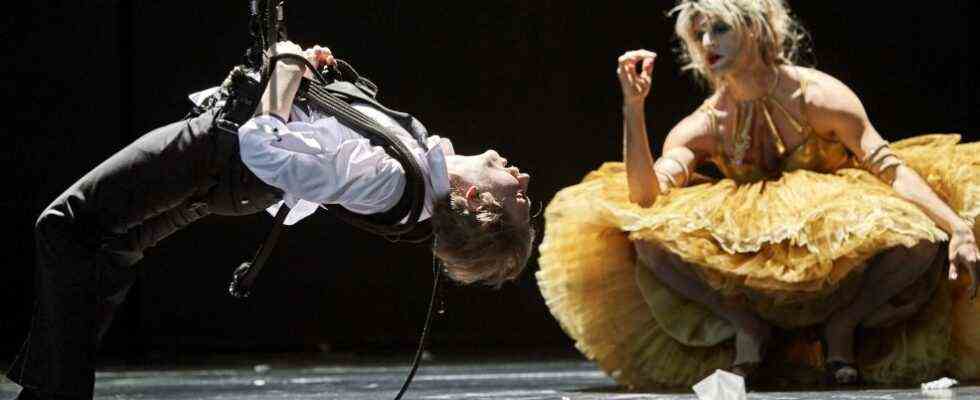The spaghetti is still sticking to the ceiling. Probably bolognese. Salad on the carpet, blood stains on the bed, the walls smeared. It must have been a wild night in room 711. “Anything was possible here,” says the hotel manager when he stands in front of the devastation. But he doesn’t take the damage, no, he takes the maid, rough and brutal. “I’m your boss,” he says, because Jessie wants to go to reception and finally get away from “Sheets, towel and cleaning”.
It is the old game in which the sexes come together, boss and employee, wife and father, prostitute and soldier. In his new piece “Seventeen Sketches from the Darkness”, Roland Schimmelpfennig sends the staff into the race with whom Arthur Schnitzler once triggered a tangible scandal. Schimmelpfennig has written a new version of the “Reigen”, which was now enthusiastically acclaimed in Stuttgart on a blazing weekend of the premiere. Because despite short-time work, the Schauspiel Stuttgart worked through during the lockdown, so that the productions have been presented almost in chord since the restart. Before the premiere in the Schauspielhaus, the German premiere of “Leuchtfeuer” by Nancy Harris was even quickly celebrated in the Kammertheater.
Schnitzler was insulted by the press as a “pornographer”, even if he hid the act behind discreet dashes in his manuscript. In the theater too, the lights go out when it comes to extremes, but Schimmelpfennig has clearly loosened up the form of the dance of death, strictly observed by Schnitzler. He uses the Ringelrein to indicate different life plans – with types you seem to know: Prenzlauer Berg mum, good family man, film producer and aged actress.
“Me Too” sends its regards and was actually the reason for the piece order
It’s about power and abuse, fraud and calculation, but Schimmelpfennig does not allow himself to be carried away to bold assignments of roles, but tells, as if by the way, of the desperate struggle for pleasure, which today has to be laboriously fueled with Viagra, porn, violence and SM games. A hundred years after the premiere of “Reigen”, sex seems to have degenerated into a tiresome duty. “I’m sorry, I can’t go that fast,” says Frank on the Tinder date with Nina. While chatting she had already guessed what to expect: “miserable life”, but “great body”.
Schimmelpfennig’s quality is to leave a lot in the vague – and yet to illuminate abysses and, for example, to delicately mark out the wounds that the soldier has experienced during the war. The fact that this evening turned out great is also thanks to the excellent staging by Tina Lanik, who does not want to tell the characters, but rather immerses her mundane search for happiness in poetic images. When the actress (Sylvana Krappatsch) tries to seduce the young author (Valentin Richter) because she is hoping for a tailor-made role, the two play through the possible script themselves – a delicious duplication of the scene. This evening is also strong in terms of acting. A masterpiece, as Marco Massafra gives the overbearing hotel manager. The chambermaid (Celina Rongen) will later file a complaint with the management.
“Me Too” sends its regards – and was actually the reason for the piece order. The director Burkhard C. Kosminski tries in many ways to locate his theater in the middle of the present. His game plan was about conspiracy theories, lateral thinkers and mass tourism. In Julian Mahid Carly’s “Mermaid Cut” the little mermaid is in a trans body. “Leuchtfeuer” came on the program because it is one of the few pieces in which the main character is a woman around sixty: Beiv, a feminist artist. The sculpture of a huge tampon made her famous, but Beiv failed as a mother, as her son knocked around her ears as if in a continuous loop. The father died on the high seas – and the son is certain: the mother was his murderess.
“Leuchtfeuer” is a conversation piece, but more of a chatty kind.
(Photo: Björn Klein)
However, “Leuchtfeuer” is a conversational piece of the overly chatty kind that lacks any linguistic skill. From sentences like “Kiss my ass, crazy” or “This cursed place” you can tell that Nancy Harris is also a screenwriter. She uses simple symbols – like large windows that Beiv has built into her house to prove to the world: “I have nothing to hide.” In the chamber theater, the villa with a panoramic view is a scaffolding that stands in a water basin (equipment by Oliver Helf). The director Sophia Bodamer seems to have tried above all to cope with the enormous mass of text. She didn’t want to follow the author’s naturalism – and that’s why she often stood rigidly against the ramp. “I need fresh air”, says the son Colm (David Müller), jumps into the water basin and stays there. This is no more convincing than the acting performance of this evening.
Christiane Roßbach, who plays this feminist artist rather pale, is by the way not yet sixty and confirms what the film producer at Schimmelpfennig once said: “No woman in her fifties is played by a woman in her fifties.” One would have expected that this producer and prototype of the toxic man would be portrayed as the revenant of Weinstein and Co. Tina Lanik has instead cleverly cast him with a woman, Evgenia Dodina. A skinny, silly little man with power. When the actress knocks on his door, she knows exactly what the rules of the game are like in the industry. Gritting her teeth, she lets herself into sex. Still, she doesn’t get the role.

